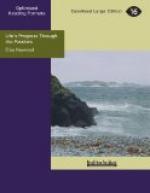The power of fear over a mind, weak either by nature, or infirmities of body: The danger of its leading to despair, is shewn by the condition Natura was reduced to by the importunities of priests of different perswasions. This chapter also demonstrates, the little power people have of judging what is really best for them, and that what has the appearance of the severest disappointment, is frequently the greatest good.
As to lose the memory of his disgrace, or at least all those gloomy reflections it had occasioned, was the chief motive which had made Natura resolve to travel a second time, it was a matter of indifference to him which way he went. He first took care to make himself master of all that was worth observation in Holland, where he found little to admire, except the Stadthouse, and the magnificence with which king William, after his accession to the crown of these kingdoms, had ornamented his palace at Loo; but the rough, unpolite behaviour of the people, disgusted him so much, that he stayed no longer among them than was necessary to see what the place afforded, and then passed on to Brussels, Antwerp, and, in fine, left no great city, either in Dutch or French Flanders unvisited; thence went into Germany, where his first route was to Hanover, having, it seems, a curiosity of seeing a prince, whose brows were one day to be incircled with the crown of England; but this country was, at that time, in so low and wretched a condition, that whether he looked on the buildings, the lands, or the appearance of the inhabitants, all equally presented a scene of poverty to his eyes; he therefore made what haste he could out of it, having found nothing, except the Elector himself, that gave him the least satisfaction. He was also at several other petty courts, all which served to inspire in him not the most favourable idea of Germany.
At length he arrived at Vienna, a city pompous enough to those who had never seen Rome and Paris; but however it may yield to them in elegance of buildings, gardening, and other delicacies of life, it was yet more inferior in the manners of the people;—he perceived among the persons of quality, an affectation of grandeur, a state without greatness, and in the lower rank of gentry, a certain stiffness, even to the meanest, and an insufferable pride, which came pretty near ferocity:—the costly, but ill-contrived parades frequently made, discovered less their riches than their bad taste, and appeared the more ridiculous to Natura, as they were extolled for their magnificence and elegance; but, even here, as indeed all over Germany, the courts of Berlin and Dresden excepted, you see rather an aim of attracting admiration and respect, than the power of it. These, however, were the sentiments of Natura, others perhaps may judge differently.
But whatever may be the deficiencies of Germany in matters of genius, wit, judgment, and manners, there is none in good eating, and good wine; and though their fashion of cookery is not altogether so polite, nor so agreeable to the palates of others as their own, yet it must be confessed, that in their way, they are very great epicures; but though they generally eat voraciously, they drink yet more; and so nimbly do they send the glass about, that a stranger finds it no small difficulty to maintain his sobriety among them.




